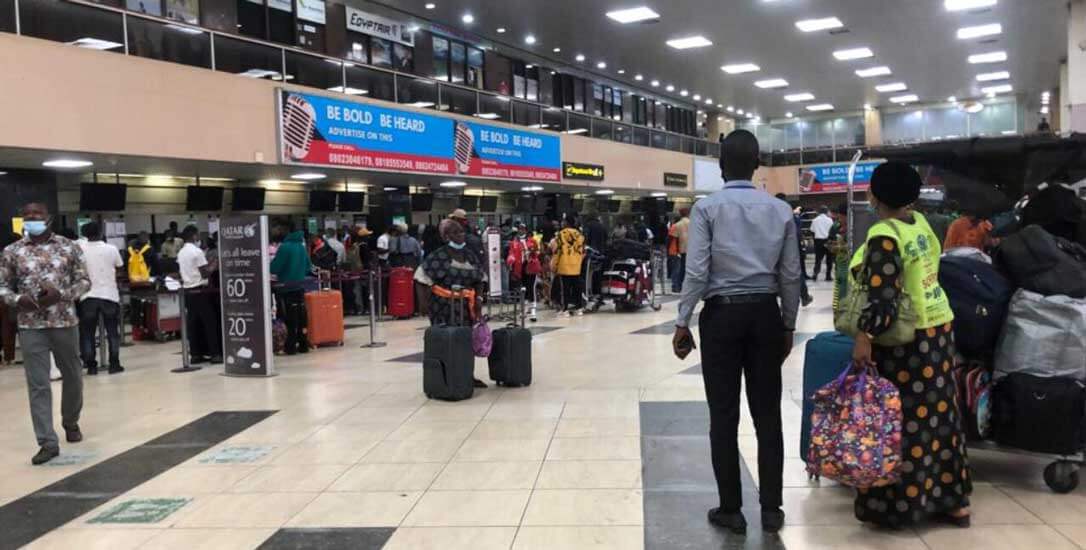What You Should Consider Before Leaving For Greener Pastures In US, UK, Canada, Others—Finance Expert
The mass migration of Nigerian professionals popularly called the ‘Japa syndrome’ reached a new height in 2022 and as a result, both government and experts are concerned about its implications on critical sectors of the economy.
The Nigerian immigration service in 2022 alone issued over 1.8 million passports to Nigerians due to increasing demands.
Advertisement
Recently, the Nigerian Minister for Labour and Employment, Chris Ngige said Nigerian professionals who are leaving the country are ‘unpatriotic.’
The unemployment rate in Nigeria is over 33.33 per cent, while the monthly payments for some of those in jobs have been described as ‘slave wage’.
An entry-level banker earns around N80,000 to N120,000 depending on the bank, while a doctor earns N250,00 to N280,00 monthly which is highly not competitive compared to what is obtainable elsewhere.
Paul Alaje, a senior economist and partner at SPM Professionals told THE WHISTLER that the development should bother the Federal Government.
Advertisement
Alaje said, “Nigeria has everything to worry about the migration of experts. I have heard from some global economists that have divergent opinions that Nigeria should not worry. They say it is called brain circulation and this is the lie they have told our government.
“They said we should not be bothered when professionals are leaving the country in their numbers. I’m not saying that people should not leave the country, what I’m saying is that when those who are gainfully employed here in Nigeria are leaving the country, it has implications for our nation.”
Alaje however, expressed concerns that some Nigerian professionals migrating abroad do not have adequate knowledge of what they may likely pass through when they travel.
In 2022, the Nigerian Medical Association said in eight years, over 5,600 Nigerian doctors traveled to the UK for jobs, while 57,000 nurses traveled in five years.
He said, “As people in European countries like Britain become disgruntled with their jobs, some of them may file for voluntary unemployment and their government may start looking for people who will collect less for more work and they will get it from Africans especially Nigeria which has the highest population.
Advertisement
“Nigerians will see what should be a call for concern in other people’s country as an opportunity. So, when they leave, they see the payment as a major increase in their earning. Here is where the problem comes.
“Accommodation is almost eight to 15 times what it is in Nigeria. The cost of feeding is not less than three times depending on the country. Transportation is also very high. Clothing may be the same but these are the costs that those in that environment are footing with the higher pay.
“People don’t have perfect information and the ability to compare. Not all the time but most of the time for people that are ‘japaring’. What then happens here? There is serious distortion in the employment system generally. We have seen people leave banks where they earn between N150,000 to N200,000 to where they can earn N400,000 to N500,000 monthly.
“But what kind of jobs? Banking jobs may not be available to them and they won’t mind working in a restaurant or at the mall and getting an equivalent of N500,000. Now they are expected to send money home.”
Alaje argued that most of the Nigerians that left are struggling with bills that hinder them from sending money to the country.
In six months of 2022, Nigeria only attracted $10.1bn in diaspora remittance despite various incentives introduced by the Central Bank of Nigeria.
Advertisement
The expert said, “The question we should ask is why has our diaspora remittance not doubled or tripled as a result of the mass exodus? What they are sending home should be proof of their success. Is it having an impact on remittances at home? The answer is no. The increase in remittance from Nigerians back home is only increasing marginally. It is not sporadic and this is where we have the challenge.
“To a large extent, it is brain drain, because it is not impacting our remittances based on Central Bank records. We should worry because a medical doctor, for instance, goes to the university spends time in the university, and goes to medical school and the school fees they paid in public schools is next to nothing. Even private universities are still cheaper than what we have abroad. The person then goes for housemanship in the teaching hospital. The amount spent is more like a scholarship compared to fees abroad like Harvard.
“Such persons leave Nigeria because the environment is poor and goes abroad to work. The challenge is that we are spending so much on education even though it is not enough and the people we are spending it on- nurses, doctors, pharmacists, scientists, social scientists, and those in arts are leaving the country.
“They are the professionals that are supposed to build the country and now they are leaving, the country will be in the hands of those that are not so trained.
“The situation has gone beyond being concerned; Nigeria is bleeding. Unfortunately, we are covering the wound other than exposing it for treatment.”



